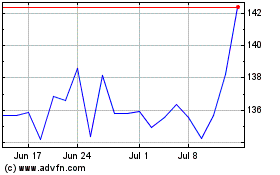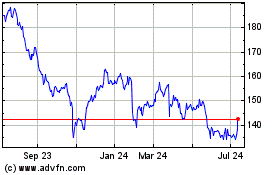By Laura Stevens
Last-minute online shoppers, beware: A perfect e-commerce storm
could be in the making for the holidays.
An unusual calendar confluence means consumers are getting a
later start on their holiday shopping. The rush -- amplified by
likely record-breaking online sales -- is setting retailers and
carriers up for potential late deliveries, shopper discontent and
higher costs.
This year, Christmas falls on a Sunday and Hanukkah starts the
day before. That places the last big brick-and-mortar shopping
weekend a full week in advance, meaning last-minute shoppers are
more likely to turn online in the days right before the
holidays.
The selling season will also be compressed, after a late start
due to the election. Distracted consumers and higher advertising
prices prompted most retailers to launch holiday pushes closer to
Thanksgiving -- which fell on Nov. 24 -- instead of the usual Nov.
1 kickoff.
Friday marks the cutoff to ship packages via ground with United
Parcel Service Inc. and FedEx Corp. and ensure they arrive in time
for Christmas. After that, consumers and retailers will have to pay
extra to send a package via air to get it there on time.
There already have been some signs of pressure on the delivery
giants' networks as consumers order online in record numbers, and
carriers have a limited amount of space in their planes next week
to accommodate last-minute holiday orders.
Amazon.com Inc. aims to take advantage of the surge in
last-minute demand with a service it dubs "Procrastinator's
Delight," offering one- or two-hour delivery in as little as one
hour until midnight Dec. 24. Wal-Mart Stores Inc. is also offering
in-store pickups of online orders as late as 6 p.m. Dec. 24,
provided the order was placed by that same time the day before.
To plan for 11th-hour orders, retailers have been working with
delivery companies for months to forecast demand, booking space in
UPS and FedEx planes for express delivery the week before
Christmas. The U.S. Postal Service said it would deliver in select
locations on Christmas Day.
"There's definitely going to be some differences in the way the
holiday season blows this year," said Hal Lawton, senior vice
president of North America at eBay Inc., who predicts more
last-minute shopping. The e-commerce marketplace plans to highlight
sellers offering expedited shipping, he said.
Holiday shoppers inevitably procrastinate, says Lauren Freedman,
senior vice president of digital strategy at digital-commerce
agency Astound Commerce. "At the end of the day, they want to buy
the stuff, and they want it fast. Now they just want it faster,"
she adds.
Last year, Donna Biroczky, a Fontana, Calif.-based social-media
manager, waited until Dec. 17 before starting her family's holiday
shopping, and then ended up doing much of it online. Amazon rushed
her a Miami Dolphins T-shirt -- at no extra cost -- when she
complained it wasn't due to arrive by the 25th. "It was shipped
overnight, and it arrived here in time," she adds.
She doesn't rule out last-minute online ordering this year if
necessary. "I would if I have to," she said. "I trust Amazon."
The last-minute rush comes at a cost -- for retailers and
carriers. A rough holiday season in 2013 caused UPS to post a $200
million hit in extra costs, while Amazon provided $20 gift
certificates to inconvenienced shoppers. A number of retailers
refunded either shipping costs or the entire cost of the order.
Some retailers ask customers to pay for last-minute express
shipping. But often they absorb the costs themselves to keep
customers happy.
The scramble to plan comes as retailers and delivery companies
look to avoid past years' delivery snafus, which have surfaced as
e-commerce becomes an increasingly popular way to holiday shop.
Last year, UPS successfully delivered on time, while FedEx's
network experienced problems which lead to retailer complaints and
Christmas Day deliveries.
The National Retail Federation forecasts e-commerce sales in
November and December will grow nearly 10% to as much as $117
billion, accounting for roughly 18% of total holiday sales.
Some things are beyond the control of retailers and carriers.
The 2013 season was doomed by bad weather, followed by a surge of
unexpected last-minute shopping that caused millions of packages to
arrive too late.
The problems prompted Amazon to start building its own delivery
network, intending to compete directly with UPS and FedEx one day,
people familiar with the matter say.
There is limited capacity in both retailer warehouses and
package-delivery networks. That makes it increasingly important
that retailers not overpromise the week before Christmas -- or ship
orders via slower, cheaper methods -- despite the temptation to do
so to ensure sales.
Amazon set the industry standard for fast, free shipping in 2005
with its two-day delivery promise for members of Prime, a program
that now costs $99 annually.
It has added delivery in as little as an hour of a smaller
selection of staples and gifts through its Prime Now service
(two-hour delivery is free; one-hour product orders cost $7.99).
Amazon is expanding its "Procrastinator's Delight" offering to more
than 30 cities in the U.S. this year.
Faster delivery has been expensive, Amazon executives admit. The
company's shipping costs increased 43% in the third quarter from a
year earlier to $3.9 billion.
But, as CFO Brian Olsavsky said on a recent earnings call,
"customers love it."
Write to Laura Stevens at laura.stevens@wsj.com
(END) Dow Jones Newswires
December 15, 2016 05:44 ET (10:44 GMT)
Copyright (c) 2016 Dow Jones & Company, Inc.
United Parcel Service (NYSE:UPS)
Historical Stock Chart
From Mar 2024 to Apr 2024

United Parcel Service (NYSE:UPS)
Historical Stock Chart
From Apr 2023 to Apr 2024
